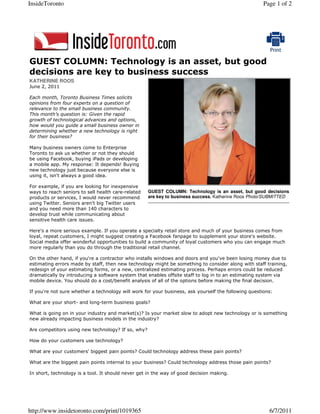TBT guest column: Technology Is An Asset Jun 11
- 1. InsideToronto Page 1 of 2 GUEST COLUMN: Technology is an asset, but good decisions are key to business success KATHERINE ROOS June 2, 2011 Each month, Toronto Business Times solicits opinions from four experts on a question of relevance to the small business community. This monthŌĆÖs question is: Given the rapid growth of technological advances and options, how would you guide a small business owner in determining whether a new technology is right for their business? Many business owners come to Enterprise Toronto to ask us whether or not they should be using Facebook, buying iPads or developing a mobile app. My response: It depends! Buying new technology just because everyone else is using it, isn't always a good idea. For example, if you are looking for inexpensive ways to reach seniors to sell health care-related GUEST COLUMN: Technology is an asset, but good decisions products or services, I would never recommend are key to business success. Katherine Roos Photo/SUBMITTED using Twitter. Seniors aren't big Twitter users and you need more than 140 characters to develop trust while communicating about sensitive health care issues. Here's a more serious example. If you operate a specialty retail store and much of your business comes from loyal, repeat customers, I might suggest creating a Facebook fanpage to supplement your store's website. Social media offer wonderful opportunities to build a community of loyal customers who you can engage much more regularly than you do through the traditional retail channel. On the other hand, if you're a contractor who installs windows and doors and you've been losing money due to estimating errors made by staff, then new technology might be something to consider along with staff training, redesign of your estimating forms, or a new, centralized estimating process. Perhaps errors could be reduced dramatically by introducing a software system that enables offsite staff to log in to an estimating system via mobile device. You should do a cost/benefit analysis of all of the options before making the final decision. If you're not sure whether a technology will work for your business, ask yourself the following questions: What are your short- and long-term business goals? What is going on in your industry and market(s)? Is your market slow to adopt new technology or is something new already impacting business models in the industry? Are competitors using new technology? If so, why? How do your customers use technology? What are your customers' biggest pain points? Could technology address these pain points? What are the biggest pain points internal to your business? Could technology address those pain points? In short, technology is a tool. It should never get in the way of good decision making. http://www.insidetoronto.com/print/1019365 6/7/2011
- 2. InsideToronto Page 2 of 2 A final thought: I attended Dr. Ron Dembo's keynote presentation at Enterprise Toronto's Innovation Camp 2011 on May 17. Dembo talked a lot about new technology, about our natural aversion to risk and the need to hedge when the future is uncertain. He suggested, for example, that if you think mobile technology could revolutionize your business or industry, a good decision in the face of uncertainly would be to hedge. In this case, invest a few resources to explore mobile. If it explodes, as many predict, you'll be ahead of the curve. If it doesn't, you didn't invest a lot, but you probably learned a lot about a technology that will inevitably impact someone's business. Katherine Roos is a small business manager at Enterprise Toronto. This article is for personal use only courtesy of InsideToronto.com - a division of Metroland Media Group Ltd. http://www.insidetoronto.com/print/1019365 6/7/2011


